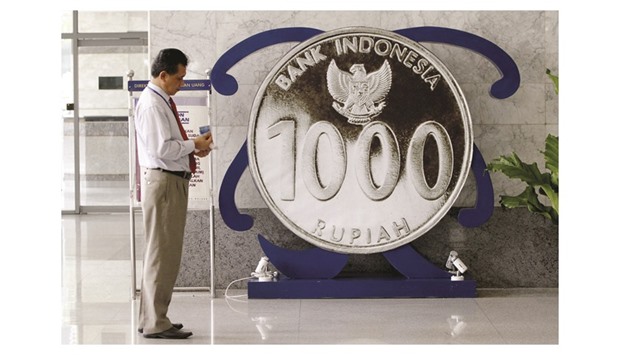A new chat group on the instant messaging phone application WhatsApp is helping Indonesia’s central bank improve its reputation for managing market expectations, something it has struggled with in the past.
Since the middle of 2015, Bank Indonesia (BI) has been running WhatsApp chatrooms with groups of local economists, using the forum to discuss and debate its policy settings and market movements.
It’s a bold and novel shift in the communication strategy of the central bank, which has a history of catching investors off-guard with its policy decisions, sometimes triggering wild market gyrations.
The good news for BI is market participants have noted less volatility in both the rupiah and local government bonds , which they attribute to improved sentiment and moderating inflation but also the new approach to communications and transparency.
“BI’s current communication pattern is more flexible, making markets relatively calmer,” Bank Central Asia’s chief economist, David Sumual, says.
“Although there have been fluctuations, BI has been able to navigate through well.”
Sumual is a member of one of BI’s WhatsApp chatrooms and believes the strategy should be adopted by other government agencies.
To be sure, the central bank’s chats with economists centre on general points of policy and economic conditions and do not divulge future policy settings, such as interest rate moves.
But BI spokesman Andiwiyana Septonarwanto told Reuters the group discussions provide valuable market feedback about monetary policy and economic developments, which allows ideas to be channelled to the board anonymously.
Indonesia’s markets have remained relatively orderly in recent months. Foreigners have pumped in $6.2bn into the high-yielding bond market since October, even as 10-year yields fell 180 basis points. The rupiah has stayed in a 13,000 and 13,975 per dollar range since January, a tight band by historic standards.
Since the 1998 Asian financial crisis, BI has formed a reputation for being excessively dovish and shocking markets with its policy moves, sparking high-double-digit inflation, currency swings and capital outflows.
Its surprise rate cut in February last year was deemed premature by market analysts and led to the rupiah being Asia’s second worst performer after the Malaysian ringgit in 2015.
In contrast, BI was more proactive in communicating its policy posture later in the year, signalling it would not cut rates until the Federal Reserve made its first rate hike in almost a decade.
Economists have been impressed with the wider push for more effective communications, which includes the WhatsApp group and livestreaming of policy announcements on YouTube.
The central bank also recently engaged the services of Ogilvy Public Relations to help with their communications strategy.
“Their forward guidance has improved and the policymaking appears to be a more joined up effort with the government,” said John Woods, Asia-pacific chief investment officer for the private bank and wealth management at Credit Suisse.
“By front-loading their rate cuts, they sent a powerful signal on their willingness to tackle the turmoil.”
Septonarwanto said there were 33 participants in the chat groups, including senior local economists such as Anton Gunawan, who was in the running to be a central bank deputy governor in 2013.
“We think it is important to get more people to engage in policymaking,” BI’s Septonarwanto said. “We have never pushed them or driven them to any direction during the discussion.”
A BI spokesman said the chat group is invite-only and does not include foreign nationals, though it does include foreign banks.
The discussions are often in the local language, Bahasa Indonesia. Sumual said the chats were free flowing, with no set schedules. Topics ranged across policy and geography, with the group debating whether and when BI should shift policy and when the Fed would act, he said.
Rangga Cipta, an economist with Samuel Sekuritas, said he is in a BI chat group with 10 others managed by the central bank’s deputy director of communication.
“Sometimes we give them feedback on how the market responds to a BI move,” Cipta said. “But discussions are still within some kind of corridor, it’s not a completely free group. We just have more access to ask about details,”
he said.

An employee of Bank Indonesia stands next to a giant one thousand rupiah coin on display inside the bank’s headquarters in Jakarta. A new chat group on the instant messaging phone application WhatsApp is helping Indonesia’s central bank improve its reputation for managing market expectations, something it has struggled with in the past.
